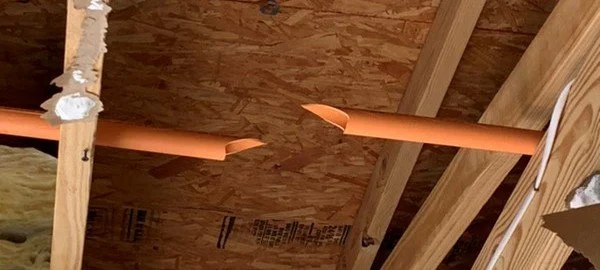Winter 2026 Will Bring Warmer Drier Weather So Are You Ready
Weather predictions for winter in Georgia in 2026 indicate that due to a La Niña condition, weather will generally be warmer and drier than usual. Winter will be mild with a few cold snaps. This leads to some different considerations to protect your home during winter.
Are You Prepared for a Freeze?
On Christmas Eve and for several days afterwards in 2022, Georgia experienced a deep freeze that wreaked havoc on the community. Pipes in homes burst. Commercial sprinkler systems burst. A LOT of water damage resulted from this event. There are predictions being made that the end of December 2025 is going to see a similar weather event. It's a smart move to prepare ahead of time! A polar vortex brings extremely low temperatures and high winds, which pose significant risks to your home, especially to your plumbing and heating systems.
Here is a comprehensive checklist to help prepare your home for the impending cold snap:
Cleaning Up After a Sick Pet
According to American Pet Products Association (APPA), approximately 71% of all households in the US have pets living in the home. According to Pew Research Center, approximately 72% of those pet-owning households have at least one dog and/or cat. With that many dogs and cats in US households, there are bound to be accidents when a pet gets sick. Cleaning up after a sick pet requires a methodical approach to ensure the safety of both humans and other animals in the home. You cannot simply clean up the mess; you must also disinfect the affected area. Cleaning removes dirt and some of the germs, but disinfecting kills the remaining germs to help prevent spread.
Lessons Homeowners Learned from Hurricane Helene
Hurricane Helene came through the southeast one year ago and wreaked havoc that is still being restored today. Hurricane Helene provided a sobering set of lessons for homeowners, emphasizing the need to be self-sufficient for an extended period and to re-evaluate financial preparedness, especially in areas not traditionally considered high-risk. Read on for key takeaways for home preparedness.
Emergency Preparedness Starts at Home
The theme for National Preparedness Month 2025 is Preparedness Starts at Home. Is your home prepared? FEMA’s Ready Campaign recommends four key steps to preparedness:
1. Know your risk.
2. Make a family emergency plan.
3. Build an emergency supply kit.
4. Get involved in your community by taking action to prepare for emergencies.
Safety Practices for Disaster Restoration
Fire and water damage restoration can be hazardous, and prioritizing safety is crucial. When you experience a disaster in your home, be sure you are using these key safety practices.
Preventing Hot Water Heater Damage to Your Home
We have been seeing a lot of water damage from water heaters leaking or even bursting lately. Preventing water damage from your water heater is crucial for protecting your home. These are some steps we all should be taking to protect our homes.
Protect Your Home from Kitchen Fires
Cooking fires remain the leading cause of home fires and injuries. Unattended cooking is the primary culprit, underscoring the importance of vigilance and preventative measures in the heart of your home. Protecting your home and loved ones from the devastation of a kitchen fire involves a multi-layered approach, from safe cooking practices to being prepared for the worst-case scenario. Read on to learn how to safeguard your kitchen from fire and smoke damage.
What Customers Need to Know About Large Water Losses in Their Homes
As we approach summer, we are starting to hear the emergency calls that start with “I came home to find…”. It may be that a faucet was left on and ran for an extremely long time. May the toilet never quite finished flushing while you were away. Some smaller plumbing leaks become quite large if no one is there to see them for a while. Some larger losses also occur when people are home. Maybe a water heater burst. Those older models hold a LOT of water. Maybe you have a front-loading washer, and the door popped open while running. In any case, when large amounts of water are spilled in your home, you need help right away. Okay, here's what homeowners (customers) need to know about dealing with large water losses in their homes:
Spring cleaning can be spring savings!
With tax season coming to an end, many of us had to make a payment or two that is pinching our wallets a little bit. Keeping your home clean and fresh doesn't have to break the bank. With that in mind, how can we save money while keeping our homes beautiful?










